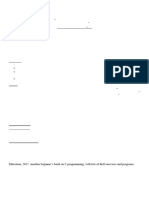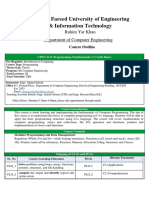0 ratings0% found this document useful (0 votes)
5 viewsProgramming Fundementals
CS-312 Programming Fundamentals is a 4-credit course with no prerequisites, focusing on problem-solving techniques and basic programming concepts. Students will learn to design and implement algorithms, understand programming languages, and perform file I/O operations. Assessment includes exams, assignments, quizzes, and projects, with reference materials from notable programming texts.
Uploaded by
logj05585Copyright
© © All Rights Reserved
Available Formats
Download as DOCX, PDF, TXT or read online on Scribd
0 ratings0% found this document useful (0 votes)
5 viewsProgramming Fundementals
CS-312 Programming Fundamentals is a 4-credit course with no prerequisites, focusing on problem-solving techniques and basic programming concepts. Students will learn to design and implement algorithms, understand programming languages, and perform file I/O operations. Assessment includes exams, assignments, quizzes, and projects, with reference materials from notable programming texts.
Uploaded by
logj05585Copyright
© © All Rights Reserved
Available Formats
Download as DOCX, PDF, TXT or read online on Scribd
You are on page 1/ 1
CS-312 Programming Fundamentals
Credit Hours: 4 (3-3) Prerequisites: None
Course Learning Outcomes (CLOs):
At the end of the course the students will be able to: Domain BT Level*
CLO-1 Understand basic problem solving steps and logic C 2
constructs C 3
CLO-2 Apply basic programing concepts C 3
CLO-3 Design and implement algorithms to solve real world
problems
* BT= Bloom’s Taxonomy, C=Cognitive domain, P=Psychomotor domain, A=
Affective domain
Course Content:
Introduction to problem solving, Programing techniques, Problem solving techniques,
Introduction to flowchart, Introduction to algorithms, Introduction to programming, Programing
languages, Role of interpreter, compiler, assembler, Basic data types, keywords, Identifiers,
Variables and constants, structure of a program, Operator and its types (assignment, increment/
decrement, arithmetic, relational, pointer and logical operators), Input/output statements,
Conditional statements and execution flow for conditional statements, Repetitive statements and
execution flow for repetitive statements, Functions, Arrays, Pointers/references, String handling
and string operations, Structures, Static and dynamic memory allocation, File I/O operations.
Teaching Methodology:
Lecturing, Written Assignments, Project
Course Assessment:
Sessional Exam, Home Assignments, Quizzes, Lab, Presentation, Final Exam
Reference Materials:
1. Starting out with Programming Logic & Degins, 4th Edition, Tony Gaddis,
2. The C Programming Language, 2nd Edition by Brian W. Kernighan, Dennis M. Ritchie
3. Object Oriented Programming in C++ by Robert Lafore
4. C How to Program, 7th Edition by Paul Deitel & Harvey Deitel
Problem Solving and Program Design in C++, 7th Edition by Jeri R. Hanly & Elliot B.
Koffman
You might also like
- Cse Programming For Problem Solving Lecture NotesNo ratings yetCse Programming For Problem Solving Lecture Notes185 pages
- Vtu 1st Sem Programming in C and Data Structures Notes 14pcd13100% (1)Vtu 1st Sem Programming in C and Data Structures Notes 14pcd13126 pages
- CS F111 Computer Programming I Sem 2024-25 HONo ratings yetCS F111 Computer Programming I Sem 2024-25 HO5 pages
- CSE 115 - 115L Course Objective and OutcomeNo ratings yetCSE 115 - 115L Course Objective and Outcome6 pages
- Programming For Problem Solving SyllabusNo ratings yetProgramming For Problem Solving Syllabus2 pages
- Khwaja Fareed University of Engineering & Information TechnologyNo ratings yetKhwaja Fareed University of Engineering & Information Technology3 pages
- NEP-B.Sc. (Computer Science) - Sem. I & II - (Syllabus)No ratings yetNEP-B.Sc. (Computer Science) - Sem. I & II - (Syllabus)17 pages
- TS Programming in C Final 23-01-2022 With Preface0% (1)TS Programming in C Final 23-01-2022 With Preface192 pages
- 104 Computer Programming & Programming Methodology (CPPM)No ratings yet104 Computer Programming & Programming Methodology (CPPM)3 pages
- Spicer Adventist University: Department of Computer Science Syllabus BSCC 111 C Programming (3 Credits)No ratings yetSpicer Adventist University: Department of Computer Science Syllabus BSCC 111 C Programming (3 Credits)5 pages
- Bece209e Structured-And-object-Oriented-programming Ela 1.0 0 Bece209eNo ratings yetBece209e Structured-And-object-Oriented-programming Ela 1.0 0 Bece209e3 pages
- Course Syllabus COSC 1436 - Programming Fundamentals INo ratings yetCourse Syllabus COSC 1436 - Programming Fundamentals I3 pages
- 0-CC1021 Programming Fundamentals Outline-V1 (Revised)No ratings yet0-CC1021 Programming Fundamentals Outline-V1 (Revised)6 pages
- Course Outline Prog Fundamental Session2014No ratings yetCourse Outline Prog Fundamental Session20143 pages
- PROGRAMMING IN C Syllabus Sage UniversityNo ratings yetPROGRAMMING IN C Syllabus Sage University3 pages
- Programming Fundamentals Course DescriptionNo ratings yetProgramming Fundamentals Course Description2 pages
- Computer Programming Book Final-Version-2No ratings yetComputer Programming Book Final-Version-2199 pages
- Computer Programming CP Course Plan SpringNo ratings yetComputer Programming CP Course Plan Spring6 pages
- CSE1001 - Introduction To Problem Solving and ProgrammingNo ratings yetCSE1001 - Introduction To Problem Solving and Programming3 pages
- Programming For Problem Solving Theory and LabNo ratings yetProgramming For Problem Solving Theory and Lab5 pages
- Basic Programming and Data Structure (C)No ratings yetBasic Programming and Data Structure (C)8 pages



























































